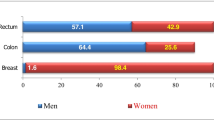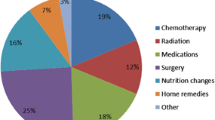Abstract
Having more health knowledge has a crucial and positive impact on cancer outcomes. Patients’ cancer knowledge influences their ability to participate actively in decision-making processes for medical care and in treatment choices. The purpose of this study was to determine the demographic and medical correlates of lack of cancer stage knowledge and desire for information among Latino cancer patients. The sample included 271 underserved Latino cancer patients recruited from four cancer clinics in New York City. Participants completed a needs assessment survey in their preferred language, which included sociodemographic and health-related questions. Close to two-thirds of the sample (65 %) had no knowledge of their stage, and 38 % were unaware of the metastatic state of their tumor. Only 15 % of the patients expressed that they would like additional information about their diagnosis and/or treatment. After controlling for sociodemographic characteristics, being an immigrant with limited English proficiency and monolingual in Spanish were predictors of stage unawareness and less desire/need for cancer information. Patients needing interpretation for health care were less likely to know whether their tumor had metastasized and their cancer stage and to desire information about their cancer diagnosis and/or treatment. This study shows considerably low levels of stage awareness among Latinos diagnosed with cancer. This lack of knowledge might adversely impact their treatment decisions and disease management. Future studies should focus on identifying barriers to acquisition of disease information and other disease-specific informational deficits.
Similar content being viewed by others
References
Johnston-Polacek GNL, Ramos MC, Ferrer RL (2007) Breast cancer disparities and decision-making among U.S. women. Patient Educ Couns 65:158–165
Rust C, Davis C (2011) Health literacy and medication adherence in underserved African-American breast cancer survivors: a qualitative study. Soc Work Health Care 50:739–761
Goodwin JS, Samet JM, Hunt WC (1996) Determinants of survival in older cancer patients. J Natl Cancer Inst 88:1031–1038
Johnson RL, Roter D, Powe NR, Cooper LA (2004) Patient race/ethnicity and quality of patient–physician communication during medical visits. Am J Public Health 94:2084–2090
Siminoff LA, Graham GC, Gordon NH (2006) Cancer communication patterns and the influence of patient characteristics: disparities in information-giving and affective behaviors. Patient Educ Couns 62:355–360
Ashing-Giwa KT, Kagawa-Singer M, Padilla GV et al (2004) The impact of cervical cancer and dysplasia: a qualitative, multiethnic study. Psychooncology 13:709–728
Ashing-Giwa KT, Padilla G, Tejero J et al (2004) Understanding the breast cancer experience of women: a qualitative study of African American, Asian American, Latina and Caucasian cancer survivors. Psychooncology 13:408–428
Gany F, Yogendran L, Massie D et al (2012) “Doctor, what do I have?” Knowledge of cancer diagnosis among immigrant/migrant minorities. J Cancer Educ 28(1):165–170
Kirsch IJA, Jenkins L, Kolstad A (1993) Adult literacy in America: a first look at the results of the National Adult Literacy Survey. Office of Educational Research and Development, US Department of Education, Washington(DC)
Haas JS, Adler NE (2001) The causes of vulnerability: disentangling the effects of race, socioeconomic status and insurance coverage on health. Report prepared for the Committee on the Consequences of Uninsurance
Chen JY, Diamant AL, Thind A, Maly RC (2008) Determinants of breast cancer knowledge among newly diagnosed, low-income, medically underserved women with breast cancer. Cancer 112:1153–1161
Cooper-Patrick L, Gallo JJ, Gonzales JJ et al (1999) Race, gender, and partnership in the patient-physician relationship. JAMA 282:583–589
Janz NK, Mujahid MS, Hawley ST, Griggs JJ, Hamilton AS, Katz SJ (2008) Racial/ethnic differences in adequacy of information and support for women with breast cancer. Cancer 113:1058–1067
Talosig-Garcia M, Davis SW (2005) Information-seeking behavior of minority breast cancer patients: an exploratory study. J Health Commun 10:53–64
Arora NK, Johnson P, Gustafson DH, McTavish F, Hawkins RP, Pingree S (2002) Barriers to information access, perceived health competence, and psychosocial health outcomes: test of a mediation model in a breast cancer sample. Patient Educ Couns 47:37–46
Crane LA (1996) Social support and adherence behavior among women with abnormal Pap smears. J Cancer Educ 11:164–173
Sullivan MC (2001) Lost in translation: how Latinos view end-of-life care. Plast Surg Nurs 21:90–91
Blackhall LJ, Murphy ST, Frank G, Michel VMA, Azen S (1995) Ethnicity and attitudes toward patient autonomy. JAMA 274:820–825
Perkins HS, Geppert C, Gonzales A, Cortez JD, Hazuda HP (2002) Cross-cultural similarities and differences in attitudes about advance care planning. J Gen Intern Med 17:48–57
Gany F, Ramirez J, Nierodzick ML, McNish T, Lobach I, Leng J (2011) Cancer portal project: a multidisciplinary approach to cancer care among Hispanic patients. J Oncol Pract 7:31–38
Gany FM, Shah SM, Changrani J (2006) New York City’s immigrant minorities: reducing cancer health disparities. Cancer 107:2071–2081
Woloshin S, Schwartz LM, Katz SJ, Welch HG (1997) Is language a barrier to the use of preventive services? J Gen Intern Med 12:472–477
Ashing-Giwa KT, Padilla GV, Bohorquez DE, Tejero JS, Garcia M (2006) Understanding the breast cancer experience of Latina women. J Psychosoc Oncol 24:19–52
Simon CM, Zyzanski SJ, Durand E, Jimenez X, Kodish ED (2006) Interpreter accuracy and informed consent among Spanish-speaking families with cancer. J Health Commun 1:509–522
Ellis J, Mullan J, Worsley A, Pai N (2012) The role of health literacy and social networks in arthritis patients’ health information-seeking behavior: a qualitative study. Int J Family Med 2012:1–6
Steptoe A, Sutcliffe I, Allen B, Coombes C (1991) Satisfaction with communication, medical knowledge, and coping style in patients with metastatic cancer. Soc Sci Med 32:627–632
Collins D, Villagran MM, Sparks L (2008) Crossing borders, crossing cultures: barriers to communication about cancer prevention and treatment along the U.S./Mexico border. Patient Educ Couns 71:333–339
Aziz NM, Rowland JH (2002) Cancer survivorship research among ethnic minority and medically underserved groups. Oncol Nurs Forum 29:789–801
Zea MC, Quezada T, Belgrave FZ (1994) Latino cultural values: their role in adjustment to disability. J Soc Behav Pers 9:185–200
Elder JP, Ayala GX, Parra-Medina D, Talavera GA (2009) Health communication in the Latino community: issues and approaches. Annu Rev Public Health 30:227–251
Acknowledgments
This research was supported by the New York Community Trust. The contents of this article are solely the responsibility of the authors and do not necessarily represent the views of the awarding agency.
Conflict of Interest
The authors indicated no potential conflicts of interest.
Author information
Authors and Affiliations
Corresponding author
Rights and permissions
About this article
Cite this article
Costas-Muniz, R., Sen, R., Leng, J. et al. Cancer Stage Knowledge and Desire for Information: Mismatch in Latino Cancer Patients?. J Canc Educ 28, 458–465 (2013). https://doi.org/10.1007/s13187-013-0487-8
Published:
Issue Date:
DOI: https://doi.org/10.1007/s13187-013-0487-8




